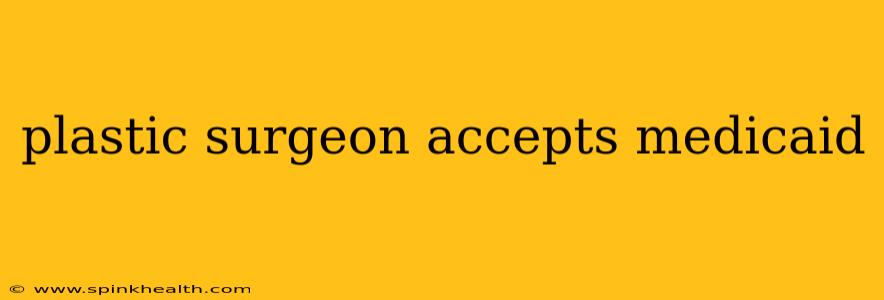Finding a Plastic Surgeon Who Accepts Medicaid: A Journey to Affordable Cosmetic Procedures
The dream of achieving a more confident and aesthetically pleasing appearance shouldn't be limited by financial constraints. Many people seek plastic surgery, but the cost can be a significant barrier. If you're on Medicaid, finding a plastic surgeon who accepts your insurance can feel like searching for a needle in a haystack. This article will guide you through the process, addressing common questions and concerns.
It's important to preface this by stating that Medicaid coverage for cosmetic procedures is extremely limited. Most plastic surgeries are considered elective procedures and therefore not covered. However, reconstructive surgeries due to accidents, birth defects, or medical conditions may be covered, depending on your state's Medicaid plan and the specifics of your case. Let's delve into this crucial distinction.
What types of plastic surgery are covered by Medicaid?
This is a critical question. Medicaid primarily covers medically necessary procedures, not cosmetic enhancements. This typically includes:
- Reconstructive surgery after a significant accident or injury: For example, if you've been in a car accident resulting in facial trauma requiring reconstructive surgery, this might be covered.
- Corrective surgery for birth defects: Cleft lip or palate repair is a common example of a reconstructive procedure often covered by Medicaid.
- Surgery to correct a medical condition: For example, breast reconstruction after a mastectomy due to breast cancer is frequently covered.
It's crucial to discuss your specific needs with your doctor and your Medicaid provider to determine coverage eligibility before undergoing any procedure.
How do I find a plastic surgeon who accepts Medicaid?
Finding a surgeon who accepts Medicaid can be challenging. The first step is to contact your state's Medicaid office directly. They can provide a list of providers in your area who participate in the Medicaid program.
You can also try searching online directories, but be cautious and thoroughly verify any information you find. Look for surgeons with affiliations to local hospitals and a strong online presence with reviews from past patients.
What questions should I ask potential surgeons?
Once you have a list of potential surgeons, don't hesitate to reach out and ask specific questions:
- "Do you accept my state's Medicaid plan?" This is the most important question. Be specific about your plan to avoid any misunderstandings.
- "What types of plastic surgery are covered under my Medicaid plan?" This will clarify what procedures are eligible.
- "What are the specific requirements for Medicaid coverage of this procedure?" Understanding the process is critical.
- "What are your fees and payment options for procedures not covered by Medicaid?" Even if the main surgery is covered, there might be associated costs not covered.
- "Can you provide me with examples of similar cases you've handled with Medicaid patients?" This can provide assurance and insight.
What if my desired procedure isn't covered by Medicaid?
If your desired plastic surgery is deemed cosmetic and not covered by Medicaid, you'll need to explore alternative options. This could include:
- Payment plans: Many surgeons offer payment plans to help manage the cost.
- Medical financing: Third-party financing options might be available.
- Savings plans: Start saving diligently to cover the cost.
Remember, thorough research and open communication with your doctor and your Medicaid provider are essential steps in navigating the process of obtaining plastic surgery while on Medicaid. Don't hesitate to ask questions; your health and well-being are paramount. The path to achieving your aesthetic goals may require patience and persistence, but it's achievable with the right approach.

